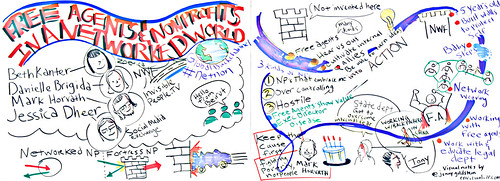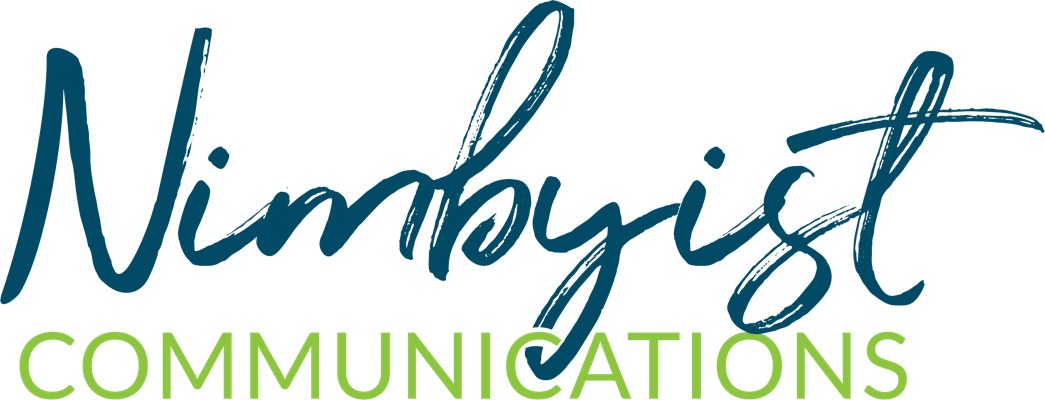 Visual notes created in real time by Jonny Goldstein
Visual notes created in real time by Jonny Goldstein
I caught bits of an interesting conversation on Twitter yesterday – online chatter around the South by Southwest Interactive (SXSWi) session Nonprofits and Free Agents in a Networked World. I skimmed through the conversation today and collected related materials for anybody else who may have missed it.
Free Agents was hosted by Beth Kanter, co-author of The Networked Nonprofit and a leader in using social media to drive change. SXSWi is an annual geekfest in Austin, Texas. It has a reputation for networking, parties, and cool launches (like Twitter and FourSquare).
The session focused on Free Agents, individuals who work from the outside of an organization toward a cause; Fortress Nonprofits, which have created protective walls and are resistant to working with outsiders; and Networked Nonprofits, which are transparent organizations, open to engaging and collaborating with people inside or outside of the organization.
For more global involvement, the session was extended beyond even Twitter. A simultaneous session was hosted in Beirut, Lebanon – which Beth connected with via Skype. And with Beth recently returned from the Middle East, volunteers used @meedan to translate the English Twitter stream into Arabic – which I thought was pretty neat.
Participants
- Beth Kanter, host (@kanter)
- Danielle Brigida, National Wildlife Federation (@starfocus)
- Mark Horvath, Invisible People (@hardlynormal)
- Jessica Dheere, SMEX Beirut (@jessdheere)
- Shawn Ahmed, a Free Agent who joined from Bangladesh (@uncultured)
Highlights from the #netnon Tweet chat
Shawn shared this video about his work as a free agent working in Bangladesh:
Shawn describes Free Agents as a bridge between an organization and a community. He explains that in Bangladesh, there is mistrust of non-profit organizations (or NGOs), but trust and respect for people doing good work – creating an opportunity for him to combine the trust people have in his personal work with the expertise within an NGO.
He also names three pillars he feels are essential for a nonprofit to work with Free Agents.
- Genuinely listen to and consider ideas coming from Free Agents
- Be an ally; it’s not up to a Free Agent to advocate his or her idea within an organization
- Turn ideas into action
Some comments that got me thinking
There was a lot of great discussion on the #netnon hashtag, but as I reviewed it today I realized Debra Askanase has a more complete summary. So rather than duplicate her work, here are some of the comments that stood out for me.
- @Michael_Hoffman: people might care about your cause, but not care about your branding document
- @derekhumphries: Someone inspiring and 20% off brand has to be worth more than someone uninspiring who is 100% on brand
- @ithorpe: For an organization to be networked, its staff needed to be networked. Informal co-operation is between individuals not institutions
- @mikesnusz: How do you help free agents promote your mission? Make materials as available as possible.
- @askdebra: Killer line: “Make everyone an influencer by empowering everyone. The influencers are really busy.” by @starfocus
And finally, a question from CNN via @Michael_Hoffman: CNN person wondering what people are thinking and doing right now to change the world. Is this a movement?
Whether you’re networked or a fortress, your organization’s brand does matter – and not nearly as much as protecting your reputation.
Craig Newmark – The Craig of Craigslist – happened to be in the session crowd and said that, as a Free Agent himself, he thinks it’s important for the organization to stay engaged with their free agents and vet what they’re doing.
While there was some discussion about use of legal forms – contracts, non disclosure agreements – I didn’t see any real consensus; I think there would be many factors to consider. But Shawn did add this: “It’s okay to screen free agents. It’s not a fad where you need to collect ’em all like pokemon :)”
More information
- Intro information about the session, held Sunday, March 13, 2011
- For a much more detailed review, check out A Global Conversation from Debra Askanase (@AskDebra).
- Or watch the full session, captured by Kami Huyse (@kamichat)



Beth posted a “behind the scenes” view of her session — a really fantastic exercise in coordination; connecting people from Lebanon, the translations so that language wouldn’t be a barrier to learning, multiple people facilitating various types of conversation (online, in person, visual).
http://www.bethkanter.org/sxsw-reflection-using-social-media-to-facilitate-a-global-back-channel-at-a-panel-session
Thanks for writing up the notes. I’m adding a link to my post!
Thanks so much, Beth – not just for hosting such an interesting session but collating all the reference notes!